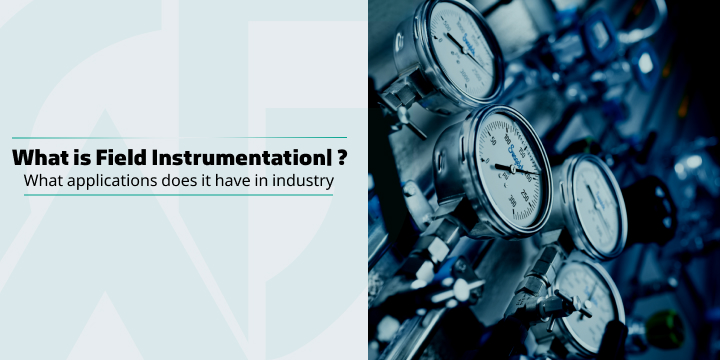Field Instrumentation refers to a collection of devices, tools, and equipment used to measure, monitor, control, and record physical and chemical parameters in industrial processes. These parameters include temperature, pressure, flow, liquid levels, gas concentrations, speed, and vibrations. Instrumentation is considered the heart of industrial processes as it enables the accuracy, speed, and control of operations. These systems continuously and automatically monitor the condition of various equipment and processes, sending precise information regarding different parameters to operators and control systems.
Key Components of Field Instrumentation
Field Instrumentation consists of various components, each playing a specific role in measuring, processing, and controlling processes. These components include:
- Sensors: Sensors are devices designed to measure various parameters such as temperature, pressure, flow, and liquid levels. These sensors can directly interact with the surrounding environment, sending information as electrical or digital signals. Examples of sensors include temperature sensors (thermocouples and RTDs), pressure sensors, level sensors, and flow sensors.
- Transducers: Transducers are responsible for converting one form of energy into another. For example, a pressure transducer can convert pressure into an electrical signal for further processing.
- Transmitters: Transmitters receive the measurement signals from sensors, amplify them, and convert them into signals that are understandable and usable by control systems.
- Controllers: Controllers process the signals and information received from sensors and transmitters. The analyzed data is then used to adjust processes by sending commands to actuators. Controllers can adjust system functions automatically or manually.
- Displays: Displays provide operators with visual representations of the measured data, either graphically or numerically. These displays can be located locally at devices or remotely in control rooms.
- Actuators: Actuators are devices used to create physical changes in systems. These changes can include opening and closing valves, adjusting pump speeds, and other process adjustments.
Applications of Field Instrumentation Across Industries
Field Instrumentation has widespread applications in various industries. These applications are especially significant in sensitive industries where high precision and control are required. Below are some of the key applications of instrumentation in different sectors:
- Oil & Gas Industry
- Measurement of pressure and temperature in pipelines and refining equipment
- Monitoring liquid and gas levels in storage tanks
- Controlling drilling and extraction processes
- Monitoring chemical compositions of gases and liquids
Precision in measuring and controlling parameters is crucial in this sector, as any fluctuation or error can result in serious risks. Instrumentation ensures safe and accurate operations in the oil and gas industry.
- Petrochemical Industry
- Monitoring chemical reactions and material composition
- Precise control of temperature, pressure, and flow in chemical product manufacturing
- Monitoring product purity
In the petrochemical industry, where accuracy in chemical processes is essential, instrumentation prevents errors and ensures high-quality product control.
- Food and Pharmaceutical Industry
- Control of temperature, humidity, and pressure in production lines
- Monitoring product quality
- Managing pasteurization and processing processes
Instrumentation plays a significant role in maintaining hygiene standards and ensuring the quality of products in these industries.
- Power Plants
- Monitoring turbine and generator performance
- Controlling boiler and cooling system processes
- Measuring flow, temperature, and pressure of steam and water
In power plants, the precise control of steam pressure, temperature, and flow is essential for preventing damage and optimizing energy consumption.
- Automotive Industry
- Quality testing of engine parts and braking systems
- Monitoring production and assembly line performance
- Measuring fuel pressure and temperature in engine systems
Precision is required in these industries, especially during the testing and assembly stages of parts.
- Building Management Systems (BMS)
- Control of HVAC (heating, ventilation, and air conditioning), lighting, and heating systems
- Monitoring energy consumption
- Enhancing safety through fire alarm and security systems
Instrumentation in BMS optimizes environmental conditions automatically and reduces energy consumption.
- Water and Wastewater Industry
- Monitoring water quality and controlling treatment processes
- Measuring water level and flow in tanks and pipelines
- Managing pumping systems and distribution networks
Instrumentation ensures that clean and safe water is delivered to consumers and that treatment processes are well-controlled.
Importance of Field Instrumentation in Industry
Field Instrumentation is considered one of the cornerstones of industrial automation. These devices have a significant impact on increasing productivity, reducing costs, and improving safety. In many industries, the lack of proper Field Instrumentation could lead to serious risks, including resource wastage, reduced product quality, and even dangerous accidents.
- Increased Productivity: Field Instrumentation allows for automatic and optimized process control, preventing resource wastage.
- Improved Safety: Continuous monitoring of hazardous conditions reduces the likelihood of accidents.
- Quality Control: Field Instrumentation ensures the production of goods to precise standards.
- Cost Efficiency: By reducing errors and optimizing processes, costs are minimized.
- Environmental Sustainability: Monitoring emissions and managing energy consumption helps reduce environmental pollution.
Conclusion
Field Instrumentation plays a critical role in enhancing and optimizing industrial processes. By utilizing this technology, industries can precisely measure, control, and monitor vital parameters, directly impacting product quality, productivity, and process safety. From its broad applications in the oil and gas industry to smart building management systems, Field Instrumentation helps reduce resource wastage, increase safety, and achieve higher standards. Additionally, as part of industrial automation, Field Instrumentation plays a key role in reducing costs and supporting environmental sustainability by reducing pollutants and managing energy usage. Field Instrumentation paves the way for future-focused industries and is recognized as a key element in the development of advanced technologies.

